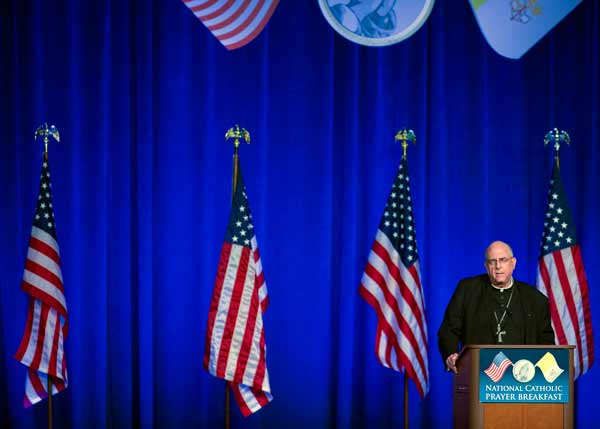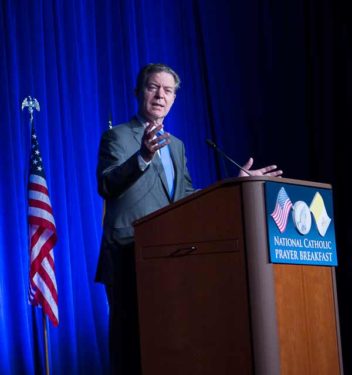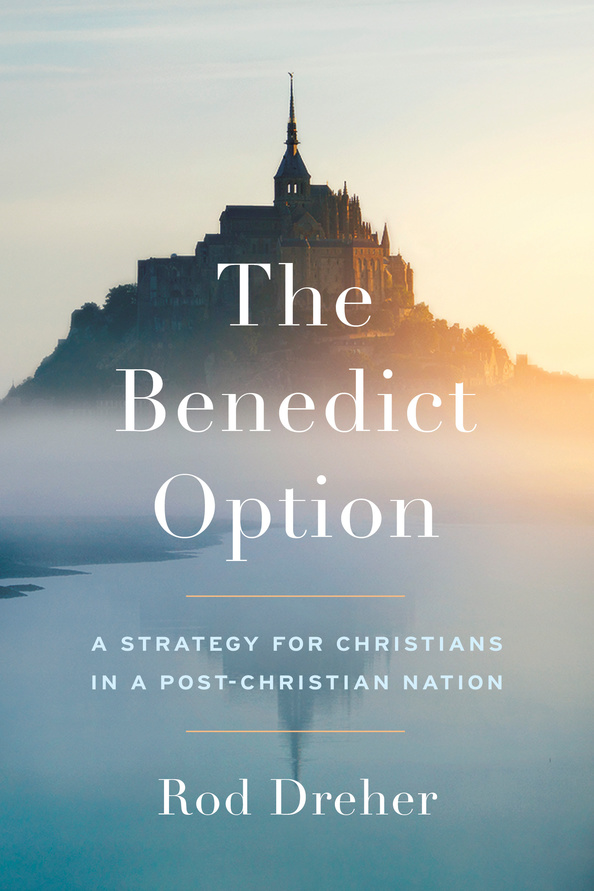
By Christopher White, The Tablet’s National Correspondent
WASHINGTON, D.C. – While American Catholics are divided both in the pews and in public life – perhaps more than ever before – nearly 1,200 Catholics came together at the National Catholic Prayer Breakfast in Washington “not as members of political parties, but as brothers and sisters in Christ.”
With those words, event chairman Mark Randall kicked off the annual event Thursday morning, May 24, at the Marriott Marquis Hotel in the nation’s capital.
Since 2004, the National Catholic Prayer Breakfast has served as a yearly occasion for prayer for the leadership and direction of the country in response to Pope John Paul II’s call for a “New Evangelization.”
In an event that bore a strong conservative stamp of approval – including a handful of Republican legislators, and former adviser to President Donald Trump, Sebastian Gorka, in attendance – Democratic Representative Dan Lipinski opened the event by leading the crowd in the Pledge of Allegiance.
This year’s breakfast included opening remarks from Speaker of the House Paul Ryan and newly appointed Ambassador at Large for International Religious Freedom, Sam Brownback, while Archbishop Joseph Naumann of Kansas City, Kansas delivered the morning’s keynote address.
While the speakers are often what attract headlines, the morning was bookended with prayer, the event’s stated purpose. It opened with the Divine Mercy Chaplet offered for religious freedom and conscience protection, and it concluded with a special prayer for a critical referendum tomorrow in Ireland over its eighth amendment which, if passed, would undo the country’s legal protections for unborn children.
The Value of Prayer
In his first major address to a Catholic audience since a controversy after firing – and then reinstating – the chaplain to the House of Representatives, Jesuit Father Patrick Conroy, Speaker Paul Ryan hailed the value of prayer at a time “when our public discourse has become more raucous than rational.”
Ryan said that Catholic Social Teaching serves as an antidote to the “deeply serious” problems in society today.
“We see moral relativism becoming more and more pervasive in our culture. Identity politics and tribalism have grown on top of this. All of it has been made more prevalent by 21st century technology,” said Ryan. “And there is plenty of money to be made on making it worse.”
Ryan said that it was up to Catholic laity and clergy alike to solve these problems.
“Our social doctrine does not offer instant answers or easy outcomes,” he said, before observing that it provides “something far more important.”
Along with a call to “civic friendship,” Ryan said that the Church’s social doctrine ensures the respect and dignity of all human persons and a caution against allowing the state “too great a reach into civil society.”
“Pope Francis has called all Catholics to be healers of the walking wounded,” he continued. “We should welcome that reminder, for it brings us back to what Catholics in this country have done for generations.”
“We should all insist that public policy at every level permits Catholic institutions the maximum freedom to serve the poor, the elderly, those yearning for foster families, women in crisis pregnancies, families torn apart by the opioid epidemic: all those who look to the Church for the help they need to live lives of purpose,” Ryan said to applause.
In a nod to his recent announcement that he would be retiring from Congress at the end of his term this November, Ryan said that he did not know what would come next, but he would continue “thinking about, and talking about” the importance of the Church’s social teaching.
God-Given Right
Brownback, former Kansas governor, used his time at the dais to make a hard sell for the importance of religious freedom – not as something merely enshrined in the country’s founding documents or in the Universal Declaration of Human Rights – but as a “God-given right.”

“No government has a right to infringe a God-given right,” he said to thunderous applause.
“Without this freedom to pursue or deny God, no other freedom would really matter.
“If we were forced to follow God, then He made that choice, not us.”
He went on to lament that more people around the world are being persecuted for their faith than ever before, urging attendees to a renewed commitment to pray and fight for the cause of religious freedom.
“It’s not just in our DNA or in our soil, it’s in our souls,” he said.
Among the many challenges facing the United States today, none is more serious than the country’s “crisis of faith,” said Archbishop Naumann in his keynote address, which happened to coincide with his 43rd anniversary of ordination to the priesthood.
While acknowledging the fact that the nation has recently endured yet another deadly school shooting, racial tensions remain high throughout the country, abortion remains lawful and widespread, and over a million young people face an undocumented legal status, Archbishop Naumann said that despite these “serious threats,” the most severe crisis is “a God-crisis.”
The prelate is the chairman-elect of the U.S. Bishops’ Committee on Pro-Life Activities. He will succeed the current chairman, Cardinal Timothy Dolan of New York, at the end of his term this November.
While acknowledging the heroes in the room who have dedicated their life to the pro-life cause, Archbishop Naumann used his remarks to make a broad appeal for a “religious revival in our nation, another great awakening.”

He began his remarks by recalling the infamous 1966 cover of Time magazine asking, “Is God Dead?” He said that at the time those words were shocking, but he couldn’t help but to recall them when reading Rod Dreher’s much-discussed 2017 book, “The Benedict Option.”
“Dreher gives his assessment of the status of faith in America: ‘God may not be quite dead, but he is in hospice care and confined to bed,’” cited Archbishop Naumann.
This crisis of faith and unbelief, he argued, has led to a denial of truth that has manifested itself in an inability to see human beings as created in the image of God.
“Materialism reigns and breeds utilitarianism – our value is determined by our usefulness,” he said. “We no longer possess inalienable rights that are God-given and from which no human being can deprive us.”
The result, he continued, has led to a hedonistic society, a devaluing of the disabled, the unborn, and the aging, and an ability to make sense of suffering.
Drawing on the words of Pope Emeritus Benedict XVI, Archbishop Naumann said that rather than an over emphasis on dogma and doctrine, the essence of Catholicism is found in an encounter with Jesus Christ.
“Without that personal encounter, our dogma and doctrine make no sense,” he said. “Without this encounter we will not have the capacity to persevere in living a virtuous life.”
If the United States in to combat the “crisis of faith,” the Archbishop said that believers must offer a compelling example of the encounter of Jesus Christ.
“We believe in a God who died, but who is far from dead,” he said.
“For those of us who have encountered the Risen Jesus, we have a responsibility to bring His love and mercy to others, especially as Pope Francis so often reminds us, to those on the peripheries,” he added. “We are called to be missionary disciples, communicating the love of Jesus to others and bringing others to encounter the Risen Lord.”
Yet in a city fueled by politics and in a room of lawmakers and their aides, he offered a different vision for their consideration.
“We are called to renew our nation, not primarily by enacting laws, but by announcing the joy and hope of the Gospel of Jesus to individuals in desperate need of its good news,” Archbishop Naumann concluded.
“It is our task to reclaim our culture, one mind, one heart, one soul at a time.”
